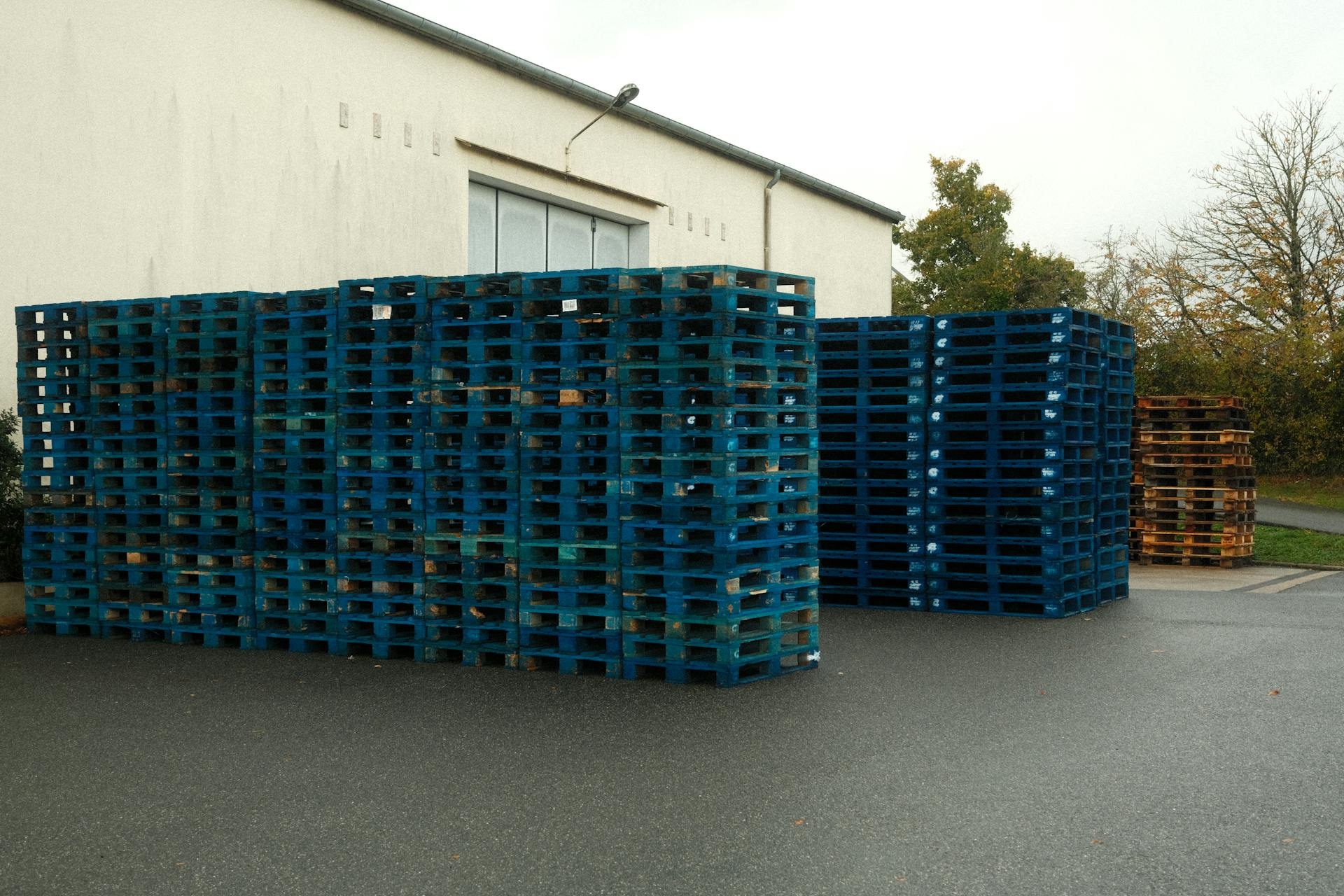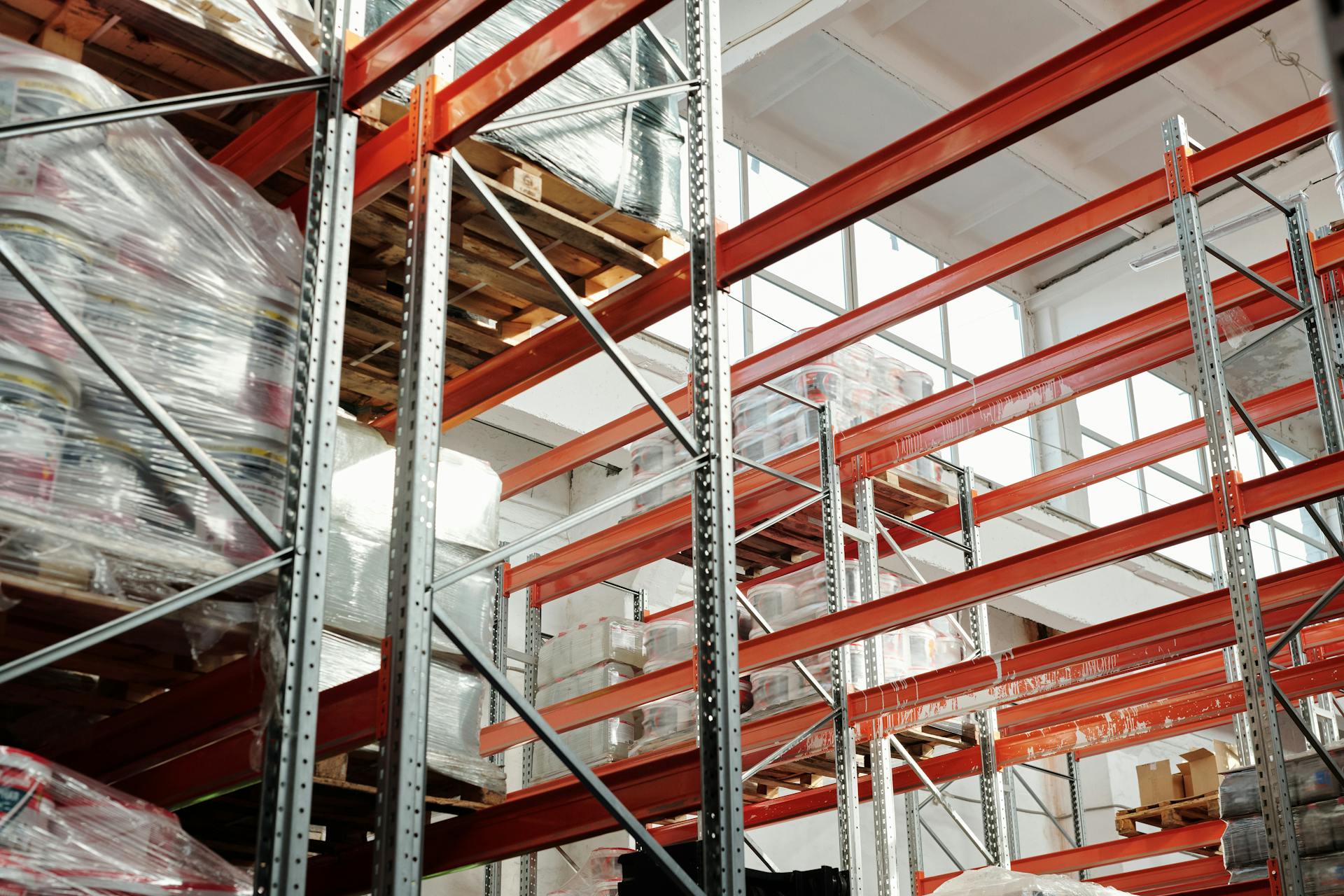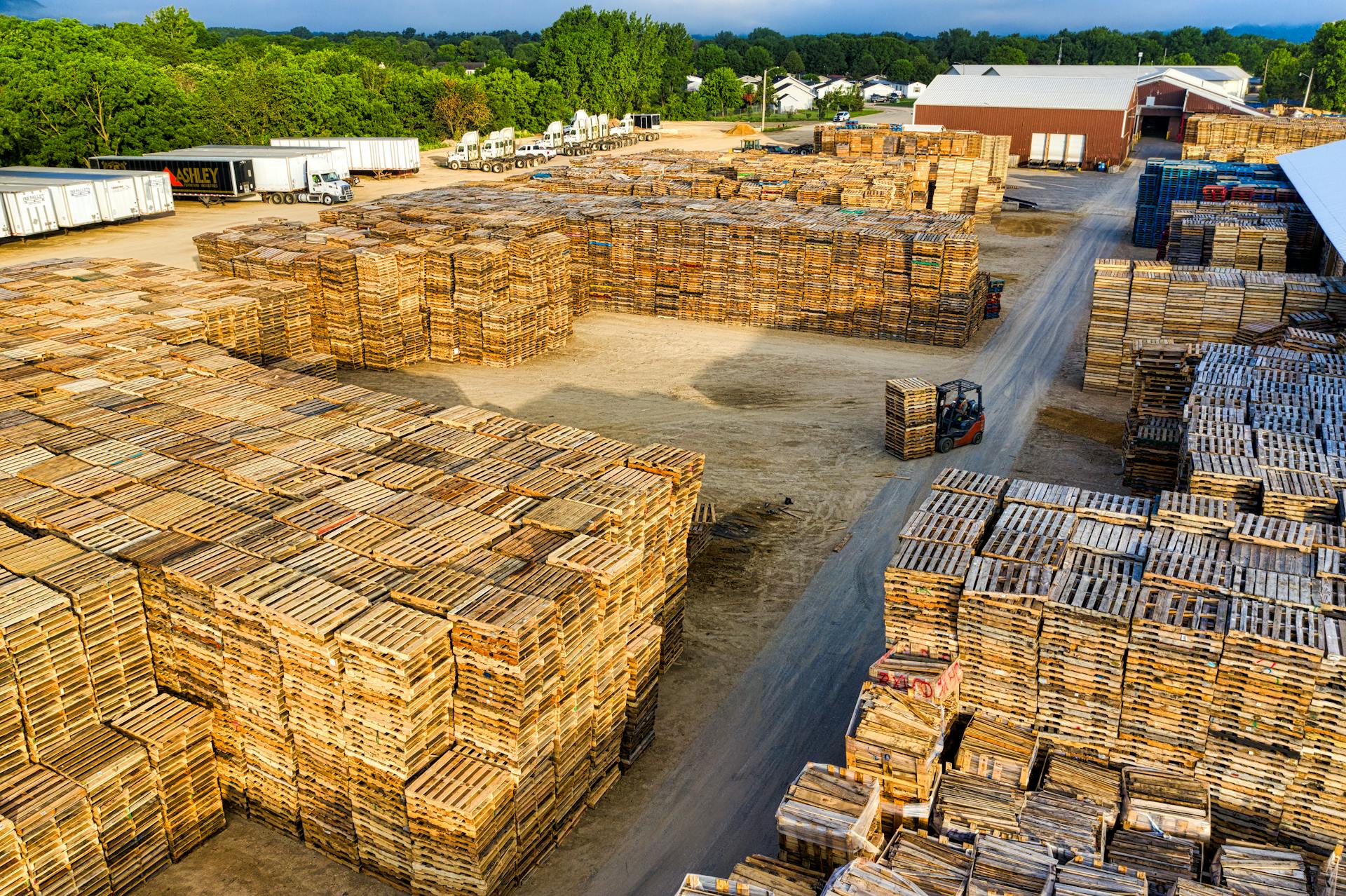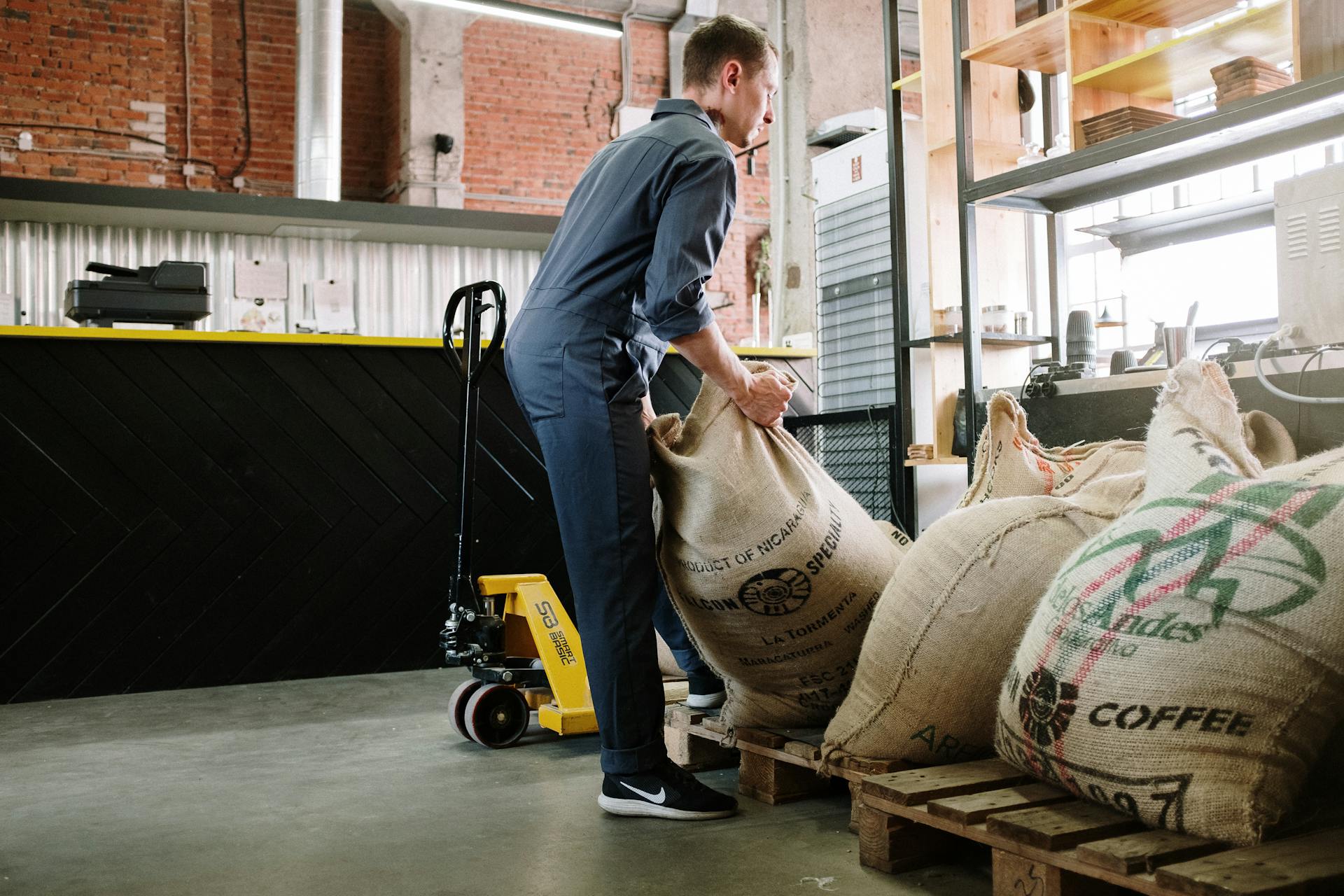
So, you're looking to learn more about IPPC pallets. In simple terms, IPPC stands for International Plant Protection Convention, which aims to protect the world's plant resources from pests and diseases.
ISPM-15, also known as the International Standard for Phytosanitary Measures Number 15, is a regulation that requires heat treatment for wooden pallets to prevent the spread of invasive pests.
Heat treatment involves exposing the pallets to high temperatures, usually around 133°F (56°C), for a certain period to kill any insects or pests that might be present. This process is crucial to ensure the pallets are safe for international trade.
The ISPM-15 regulation applies to all wooden pallets used for shipping goods across international borders, and it's essential to comply with this regulation to avoid delays or penalties.
Suggestion: Heat Treated Pallets Stamp
What Are IPCC Pallets?
IPPC pallets are a type of pallet that has been certified by the International Plant Protection Committee (IPPC) to minimize the spread of pests and diseases.
The IPPC is an international treaty designed to protect plants, and its certification is a guarantee that the pallet has not been treated with chemicals.
Only wooden pallets made domestically or in the United States are allowed in Canada without an IPPC certification.
IPPC certified pallets are the safest to ship or use, making them a great choice for environmentally responsible organizations.
These pallets often find new life after shipping, as they can be safely burned and used as an energy source.
ISPM-15 Certification
ISPM-15 Certification is a must for international shipping, and it's not just a recommendation, but a requirement for most overseas shipping. The International Plant Protection Convention (IPPC) has worked with phytosanitary experts to combat pest risk with the regulation of wood packaging material for international trade, also known as the International Standard for Phytosanitary Measures (ISPM) 15.
To be certified, the entity that applies the IPPC certification marking must be licensed and meet specific standards under ISPM 15, and the wood must be debarked before treatment. This ensures that the wood packaging material is pest-free and meets the required standards.
Related reading: B Pallets

IPPC certified pallets will have a stamp including the IPPC logo and a code indicating the origins of the pallet and what methods it was treated with. The code looks like this: XX – 000 – YY, where XX is the country code (CA is Canada), 000 will show the license number of the manufacturer, and YY shows how the wood has been treated (HT means heat treated).
Here is a breakdown of the code:
This system ensures that you can identify your IPPC certified pallet at a glance.
Ispm 15 Function
ISPM 15 outlines a set of regulations designed to minimize the spread of diseases and pests from one country to another, including the United States, Australia, and the UK.
Pests and biological infections can spread through wood used in packaging materials, including pallets, crates, dunnage, and more.
ISPM 15 aims to prevent the introduction of invasive pests through the regulation of wood packaging material for international trade.
Consider reading: Packaging Pallets
It's worth noting that ISPM 15 is not an international law per se, but many countries have agreed to adopt the regulations.
ISPM 15 compliant pallets, such as the custom IPPC ISPM-15 pallets and customer IPPC ISPM-15 skids mentioned in Example 1, qualify to create packaging for products that are shipped out of the country or for DOD shipments.
Here's a summary of the key functions of ISPM 15:
Who Certifies and Marks the Wood?
The entity that applies the IPPC certification marking must be licensed and meet specific standards under ISPM 15.
To become licensed, they must go through the Canadian Food Inspection Agency (CFIA) for certification, as seen with A-1 Pallets Ltd.
A-1 Pallets Ltd. in Onslow Mountain, Nova Scotia, is a certified facility through the CFIA to produce wood packaging products for shipment to member countries.
Regular inspections and recordkeeping are required to ensure compliance with the program.
The wood must also be debarked before treatment, as per the ISPM 15 standards.
Every IPPC certified pallet is stamped with a unique code, making it easily identifiable.
Certification Process
The certification process for IPPC pallets is a crucial step in ensuring the safe transportation of goods.
Only wooden pallets made domestically or in the United States are allowed in Canada without an IPPC certification.
To become IPPC certified, a pallet must meet specific standards for minimizing the spread of pests and diseases.
The International Plant Protection Committee (IPPC) is responsible for setting these standards.
IPPC certified pallets are stamped with a code that includes the IPPC logo and information about the pallet's origins and treatment methods.
The code looks like this: XX – 000 – YY, where XX is the country code, 000 is the license number of the manufacturer, and YY shows how the wood has been treated.
For example, HT means the wood has been heat treated.
Broaden your view: Non Treated Pallets
Types of Pallets
There are various types of IPPC pallets designed for specific industries and purposes.
You can choose from Petrol Chemical Pallets, Pharmaceutical Industry pallets, and USA Pallets, among others.
Each type of pallet is tailored to meet the unique needs of its respective industry, ensuring safe and efficient transportation of goods.
Here are some of the most common types of IPPC pallets:
- Petrol Chemical Pallet
- Pharmaceutical Industry
- USA Pallet
- Europe Pallet
- Electronic Industry
- Japan Pallet
- Multi Purpose Pallet
- Technical Wood Moulded Pallet
- IPPC Box & Crate
- Industrial Packing
- D.I.Y. IPPC Collapsible Crate
Type of Pallets
There are various types of pallets designed for specific industries and purposes. One of the most important distinctions is between pallets for different regions, such as the USA Pallet and the Europe Pallet.
Each region has its own set of standards and regulations for pallets. For example, the USA Pallet meets specific requirements for use in the United States.
If you're in the pharmaceutical industry, you'll need a Pharmaceutical Industry pallet that meets the necessary standards for handling and storing sensitive products.
In contrast, a Petrol Chemical Pallet is designed for use in the chemical industry, where safety and containment are top priorities.
If you're looking for a more versatile option, a Multi Purpose Pallet can be used in a variety of settings.
Suggestion: Grade B Pallets
The Electronic Industry also has its own specialized pallets, designed to protect sensitive electronics during shipping and storage.
Japan Pallets are another example of region-specific pallets, designed to meet the unique needs of the Japanese market.
If you're looking for a more DIY-friendly option, a D.I.Y. IPPC Collapsible Crate can be a good choice.
Here are some examples of the different types of pallets available:
- Petrol Chemical Pallet
- Pharmaceutical Industry pallet
- USA Pallet
- Europe Pallet
- Electronic Industry pallet
- Japan Pallet
- Multi Purpose Pallet
- Technical Wood Moulded Pallet
- IPPC Box & Crate
- D.I.Y. IPPC Collapsible Crate
Remember to choose a pallet that meets the specific needs of your industry and application.
IPCC Pallet Four-Way Block
The IPCC Pallet Four-Way Block is a sturdy option for heavy loads. It can handle a dynamic load of 1000 kgs and a static load of 3000 kgs.
The size of this pallet varies, but one common size is 1000mm x 1200mm. Other sizes are also available, including 1100mm x 1100mm and 1200mm x 1000mm.
Here are some key specifications for the IPCC Pallet Four-Way Block:
The IPCC Pallet Four-Way Block is a reliable choice for heavy-duty applications.
Custom Ispm-15 Heat-Treated Pallets/Skids
Custom ISPM-15 heat-treated pallets and skids are a type of packaging material that's designed for international shipping and meets strict regulations to prevent the spread of invasive pests.
These pallets and skids are treated with heat to exterminate any potential insect infestation, making them a safer alternative to chemically treated wood.
Heat-treated pallets and skids remain valid as long as they're not altered by the addition of other wood components, eliminating the need for further treatment or fumigation.
ISPM-15 compliant pallets have a pest-free and low moisture content, which reduces the risk of condensation or contamination during shipping.
Eco-friendly and made from high-density wood, these pallets are also water-resistant and have a high nail-holding power.
Custom ISPM-15 heat-treated pallets and skids can be designed to accommodate specific shipping needs, with sizes ranging from 1000mm x 1200mm and load capacities of up to 4000 kgs.
Here are some key features of ISPM-15 compliant pallets:
Treatment and Reuse
You can reuse treated pallets for shipping if they remain intact and you don't remove any components from them. However, if you need to repair them, a certified IPPC fumigator or heat-treatment company must re-treat the wood.
Heat treatment is a safer alternative to chemically treating wood, as the chemicals can be toxic. Heat treatment is also found to save you on shipping as it lowers the weight of the packaging.
Quality Support heat treats all of their custom IPPC skids and pallets to exterminate any potential insect infestation, and the treatment removes any moisture. This means that heat-treated skids and pallets remain valid as an IPPC ISPM-15 skid or pallet as long as they are not altered by the addition of other wood components.
How We Treat Custom Skids & Pallets
We take pride in treating our custom skids and pallets with care to ensure they meet the highest standards. Quality Support heat treats all of our custom IPPC skids and pallets to exterminate any potential insect infestation.
A unique perspective: Custom Clearance and Freight Forwarding Course

Heat treatment is a safer and more effective alternative to chemically treating wood. This method eliminates the risk of toxic chemicals and reduces the weight of the packaging, saving you on shipping costs.
You don't have to worry about heat-treated skids and pallets expiring. The treatment removes any moisture, making them valid as an IPPC ISPM-15 skid or pallet as long as they are not altered by the addition of other wood components.
Our custom IPPC ISPM-15 pallets and skids are designed to accommodate any weight and size range. If you need a custom skid or pallet, contact our team to request a quote today.
You might enjoy: U Haul Auto Transport Trailer Weight
Why Are Some Pallets Heat-Treated and Others Fumigated?
Some pallets are heat-treated while others are fumigated with Methyl Bromide. Heat treatment not only kills pests or bacteria and fungi, but it also prolongs the life and safety of pallets by removing moisture and slowing decay.
Heat-treated pallets are safe for Do-It-Yourself projects, kindling, or other uses outside of shipping. This is because heat treatment removes all the chemicals used in the process, making them safe for reuse.
Many countries, including European Union members, prohibit the use of Methyl Bromide due to its link to Ozone depletion in the atmosphere.
Reusing Treated Pallets

You can reuse treated pallets if they remain intact and you don't remove any components from them. This way, you can use them for shipping again.
However, if you need to repair a treated pallet, a certified IPPC fumigator or heat-treatment company must re-treat the wood.
The U.S. government is close to requiring IPPC certified material for cross-border shipping, which means it's essential to ensure your pallets meet these standards.
A certified IPPC facility, like A-1 Pallets Ltd. in Nova Scotia, can provide certified heat-treated used wooden pallets for shipping to overseas markets.
Custom and Advantages
The IPPC pallet is a game-changer for anyone looking to simplify their shipping and storage needs. One of the biggest advantages is that it's ISPM compliant, which means no further heat treatment or fumigation is required.
This not only saves time and money but also reduces the risk of pest infestations. The pallet itself is also eco-friendly, making it a great choice for those who care about the environment.
With a dynamic load of 1500 kgs and a static load of 4000 kgs, the IPPC pallet is incredibly durable and can withstand heavy loads. Its size of 1000mm x 1200mm makes it easy to stack and store in warehouses.
Here are some of the key benefits of using an IPPC pallet:
- No further heat treatment or fumigation is required
- Pest free and low moisture content
- Eco-friendly
- No cracks, higher nail holding power
- Space-saving and safe for warehouse storage
The IPPC pallet is also incredibly easy to use, with ease of custom clearance and administrative work making it a breeze to get your goods moving.
What Is a Logo?
The IPPC logo is a certification that the wood used on pallets was heat-treated as required by the American Lumber Standard Committee (ALSC).
Manufacturers who require a compliant IPPC heat-treated logo often resort to coding methods that are labor-intensive and unreliable.
The IPPC logo is a crucial indicator that the wood used on pallets meets specific standards, ensuring compliance with regulations.
Frequently Asked Questions
Is ISPM 15 the same as IPPC?
ISPM 15 is a standard developed by the International Plant Protection Convention (IPPC), not the same entity. The IPPC is a multilateral treaty that addresses global plant threats, administered by the Food and Agriculture Organization (FAO) of the United Nations.
Can you burn IPPC pallets?
No, you should not burn IPPC pallets, as the IPPC stamp only indicates compliance with pest control standards, not safety for burning. Burning IPPC pallets may pose a risk to your health and the environment.
Featured Images: pexels.com


